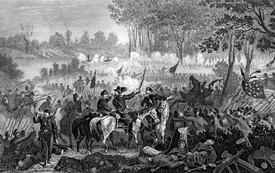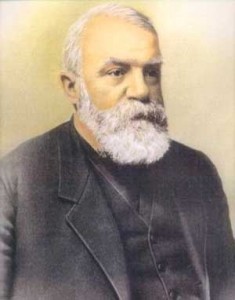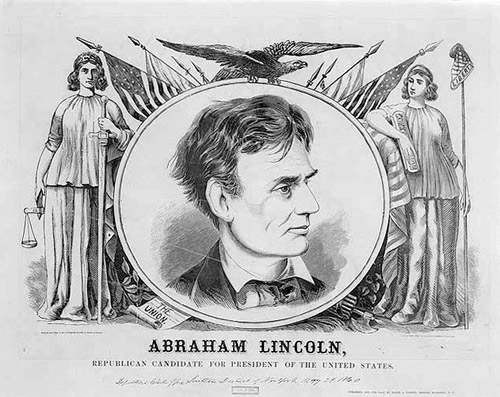Here are just a few brief thoughts to put the issue of slavery and the Civil War into perspective:
- The Baptists at the time of the Civil War were basically divided into two very loose conventions: The Southern Baptists and Northern Baptists. They were one fellowship, but separated because they began to disallow slaveholders to be supported as missionaries. Therefore, the Southerners separated just before the Civil War because they still believed that slavery was instituted by God to “keep the races separate.”
- The Puritans (Congregationalists) of the era strongly opposed slavery. One of those men was D.L. Moody. Moody enlisted in service with the YMCA to preach to Northern soldiers of General Grant, and was present at the battles of Shiloh, Murfreesboro, and the taking of Richmond. Moody was also a staunch supporter of Abraham Lincoln and the Republican Party. The south may have had General Jackson on their side praying, but the north had “General” Moody praying!
- Other Christian abolitionists of the time included Peter Cartwright and Charles Finney. Even the English preacher, Charles H. Spurgeon preached against American slavery. In the south, his sermons were outlawed and burned due to his strong opposition of slavery.
- The Republican Party was only a few years old when their first president, Abraham Lincoln, was elected. The Republicans were the main stream abolitionists of the period. Democrats, for the most part, opposed the war and complete abolition.
- Yes, I believe that the Civil War, at the beginning, was an issue of states rights (Confederate thought), and preservation of the nation (Union thought). No, the union was not the side who made the war an issue of slavery: it was the south. The north simply wanted the Union preserved, while the Confederacy wanted their supreme “state right” of slavery.
- The south was the aggressor. Simply because they didn’t like that Abraham Lincoln and the Republicans were elected, they separated from the Union. They fired the first shots at Fort Sumpter. They continually insisted that “their land” was being invaded, while at the same time invading the Northern states of Kansas, Missouri, Kentucky, Maryland, and Pennsylvania. Any black man found in those states, whether they had ever been a slave or not, was sent into bondage. Now, who was the aggressor? And who was trying to preserve peace and justice?
- The Confederacy had some very godly generals fighting for them: including Thomas “Stonewall” Jackson and Robert E. Lee. That does not prove, however, that the south was justified.
- Some would say that it was good that slaves were brought to America, because without slavery they would still be living in absolute poverty in Africa. So, they would say, American slavery was a righteous cause. Here, I believe I can equate the bondage of Israel in Egypt with the bondage of blacks in America. It grieved God to see his people suffer in affliction. He did not want them in slavery. Yet even amidst the slavery, God’s Divine Will still worked, despite the sin of slave-holding by the Egyptians and the Confederacy. Even in spite of bondage, slaves came to know Christ as Savior, and would eventually be free in the most prosperous country in the world: with an opportunity to live with Christian liberty.
- The freeing of slaves itself did not promote the degradation of much of the black society as we know it today. There were many Christian agencies (not government!) that taught the freed slaves business practice, land ownership, and agriculture. Men like Booker T. Washington promoted the ideas of opportunity through industry and intelligence. Black society made large steps in the right direction during reconstruction and into the late 1800’s. It was not until the socialist/welfare preachings of W.E.B. DuBois and others that black culture took a drastic turn in the wrong direction. Unfortunately, entitlement replaced industry in the minds of many blacks, the results of which is seen prominently today. However, each man still has his chance to be a successful American, no matter what his or her background may entail.
Let me know where you agree, or even disagree! Comment away!
RGRW5YZGDUSY





I was really going to skip the whole study part…look at the pretty pictures and move on…but this was very interesting. I think I even learned something:)
Oh boy!
Can you please tell me who did the print of Lee and Jackson that you have featured on this page????
I’m not sure exactly who did it. I know that I got the picture from the National Park Service here. I would like to know who drew it if you find out. Thank’s for visiting!
Hey Dustin, I like your article. I’m a big Civil War buff..not an expert, just an enthusiast. And even more, a D.L. Moody fan, having attended Moody Bible Insititute and being a pastor, he was quite a bold proclaimer of the Gospel. Moody cut his preaching teeth here in Chicago at the start of the war, witnessing to Rebel prisoners of war being held in Camp Douglas. He raised money to build a chapel and supply it with books and tracts, and later visited battle fields with the United States Christian Commission, bringing supplies, food and most importantly the Good News to the wounded left behind in the makeshift hospitals. The Life of D.L. Moody by his son W.R. Moody and Wilbur Chapman’s The Life and Work of Dwight L. Moody give a great deal of information regarding his Civil War experiences.
You’re comments about the plight and history of Black’s is unenlightened. You need to study about the history of Black’s before slavery. Slavery didn’t save us, but that is the implication you have made. Nothing good came out of the institution of slavery. Study more before you write an article.
I was not saying that slavery itself saved or did good for anyone. As a Christian though, and from that worldview, I do understand that even in the midst of horrible circumstances, God can still make good things happen — that is a basic tenant of Christianity. Notice that the key phrase I used is “in spite of.” I also hope you understand that this was not meant to be an exhaustive history (though I wouldn’t mind tackling that some day); it is was simply a few thoughts I had after reading some nonfiction books several years ago. I do stand by these comments 100%, though. If you find anything factually wrong, please “enlighten” me.
I’m actually a little surprised with your criticism. This whole post is completely against the worldview of the Confederacy, and in defence of that period’s mainstream abolitionists.
As a black man I have a problem with you glorifying the horrors of U.S. slavery!!!!! It was a black holocaust period!!! If you used that argument on the jews negative experience you’d be laughed into oblivion. And the real issue us the effects of slavery are yet being perpetuated. Just say it was wrong stop flying the rebel flag and rubbing the vestiges of those evil times and let’s move forward in Jesus name!!!
Where did I glorify slavery? Did you read the article? Where is the rebel flag I’m flying?
Like I mentioned to another commenter, I was describing different people’s opinions throughout the article, and the gist is that slavery was wrong…I am completely against the Confederate viewpoint.
“The Puritans (Congregationalists) of the era strongly opposed slavery” is a false statement. It is a revisionist account given by conservatives (which I am a conservative) to not have to face the truth that from the beginning of the colonies MOST puritans were pro slavery. There were some during this time that were abolitionists but few. Most abolitionists were considered liberal and shunned by conservative believers. Charles Hodge was one of the most well know defenders against modernism in the church at the time and he was an absolute racist who believed that blacks were inferior.
I too would like to highlight men like D L Moody and Spurgeon for taking very hard stands and choosing Biblical truth and love over system but the fact that they were the few gives greater light to their bravery and faithfulness. The era does not get a pass off the back of these few men.